|
|
|
 |
COMMUNITIES |
|
|
| |
| Businesses and communities depend on each other to create an empowered and a prosperous society. To nourish and nurture this interdependent relationship, we consistently invest time and resources in community development. |
| We go beyond the customary role of business of paying taxes, generating employment and complying with the law of the land. We seed interventions in areas that act as development multipliers - child and maternal welfare, sanitation and hygiene, public infrastructure development and skill building, for creating long-term value for our host communities. The aim is to make a holistic improvement in the quality of life of the local communities. The majority of our initiatives are carried out in collaboration with community organisations and are developed in partnership, utilising a needs-based approach to community investment, underpinned by the use of 'Public-Private-People-Partnership' (4Ps) model. |
| Our community engagement process, together with baseline studies and needs assessments, helps us to develop initiatives for local communities in pressing areas of need. |
| |
| Our CSR Policy and Social Investment Standard guide our community engagement journey. |
| |
| We often recruit external experts to assist us in both understanding local needs and to engage with relevant communities. A majority of our workforce at each facility belongs to the local communities. Engagement with these employees and their involvement in social interventions, along with members of the community, also offers a better understanding of local issues, enhances community ownership and results in comprehensive outcomes. The level of our community engagement is customised according to the business cycle - commencing with the project and progressing through the operation to eventual closure. |
| To ensure that change is significant and lasting, we follow a model wherein programmes are designed with a clear mandate, that once they have enough traction, they will be handed over to the communities to manage. |
| |
| We have prioritised the Sustainable Development Goals (SDGs) based on our material issues as well as operational competency, and are now in the process of chalking out an action plan to address the relevant Goals. |
| |
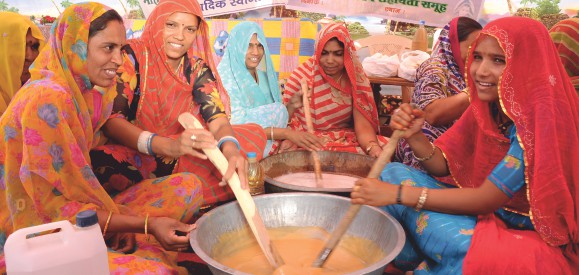 |
|
|
| US$ 37 mn |
| 0.35% of revenue spent on social
investment (FY 2014-15: 0.33%) |
| 2.25 |
| million lives benefited |
| |
| Outreach: |
| 578 core villages |
| 1,010 peripheral villages |
| Codli mine, Goa |
| Continued CSR |
|
despite suspended operations |
| A first-of-its-kind corporate
partnership with the Ministry of
Women and Child Development,
India to develop |
| 4,000 |
|
next-gen Anganwadis |
| Social Impact Assessment study
concluded at HZL and Cairn |
| Peer benchmarking study on our
'Licence to operate' in partnership
with Indiana University |
| Alignment with UN Sustainable
Development Goals |
| Extending WBCSD - WASH pledge
to community |
| |
|
|
|
|
|
|
|
| |
| *Some of the beneficieries could be engaged in
more than one project. |
|
|
|
| |
| The value shared with communities is proportional to the economic value generated by the business and we have responded resiliently to the current macro-economic scenario. We have looked closely at our programmes to understand what contributes to our social licence to operate and realigned the scope and objectives of our programmes. While this has led to a reduction in our footprint, our programmes have a sharper focus and stronger alignment with business imperatives. |
| Based on the results of need-based assessment and social impact assessment studies, we are aligning our projects with priority needs of the communities and countries. Accordingly, some of the projects have been discontinued, few interventions have been expanded and new programmes are being launched. This consolidation is not just strengthening our social 'license to operate' but also enabling us to invest in most pressing issues. A case in point is our consistent support to women Self Help Groups (SHGs) in line with our reinforced focus on women empowerment; we supported 2,800 SHGs this year vis-à-vis 1,200 in the previous year. Similarly, our support to youth in our operational areas in terms of building vocational skills has also gone up from 3,844 to 5,861. |
| |
| AREAS OF FOCUS |
| Our programmes address specific priority areas of the community we operate in. Due to the nature of our business, most of our operations are located in hinterlands of developing nations and our intervention focus has broadly been in the following areas: Education | Health - Water & Sanitation | Women Empowerment | Skill Enhancement
Farming & Animal Husbandry |
| |
EDUCATION
|
| Education is a bridge between an individual's potential and progress. Ensuring right to quality education for every child is a mammoth task and calls for collaboration from all quarters. Vedanta has been joining forces with various government bodies and thought leaders to facilitate bona fide learning avenues for children of marginalised communities. |
| Last year, we conducted a comprehensive community needs assessment exercise covering every location in the vicinity of our operations. Based on the inputs, 'Women & Child Development' and 'Vocational Skills' were identified as high priority areas. Hence in the reporting year, majority of our interventions were focussed in this domain. However, we continued to add value in other focus areas as well. |
| We believe that contributions in 'Women & Child Development' and 'Vocational Skills' can have a multiplier effect on the quality of life of the entire community. |
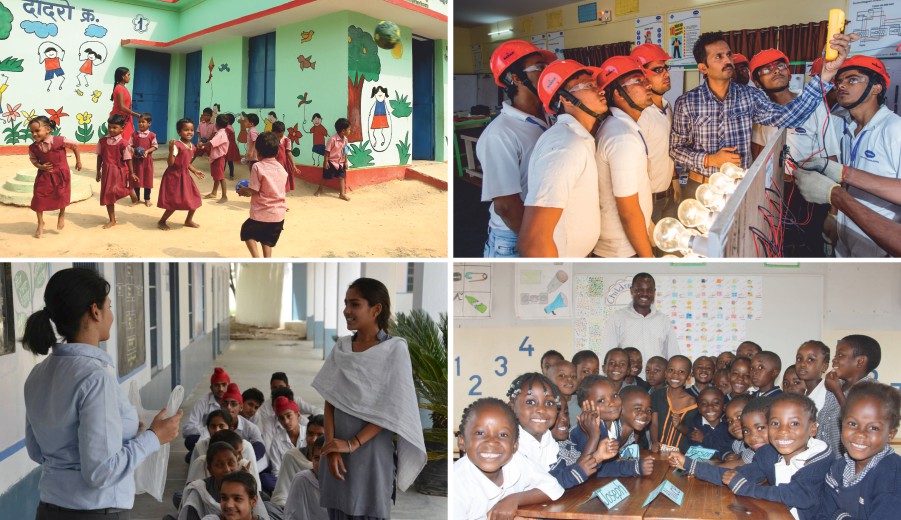 |
| Under the Vedanta Bal Chetna Anganwadi (VBCA) programme, we run 3,100+ Anganwadis in partnership with the Indian government across several parts of India. This year, about 71,000 children availed preschool level education in these child care centres. We also operate five centralised kitchens serving fresh, nutritious and delicious meals to 96,800+ children every day to support the Government's midday meal programme. |
| To provide access to higher education, we run 16 schools and colleges, most of them close to our operations. Over 211,000 students studied in these schools this year. In the reporting year, Sesa Iron Ore partnered with Goa's Sarva Shiksha Abhiyan programme to develop textbooks in local language for primary schools of Goa. This intervention will go a long way in facilitating learning for children across the state. |
| In rural households, due to scant financial resources, young boys and girls often lose out on educational opportunities. Vedanta addresses this issue by providing scholarships to girls who opt for higher education. This year, over 900 such scholarships were granted. |
|
|
 |
I am deeply overwhelmed and
applaud Vedanta's efforts in
the field of education which
is
a great investment for the
generations to come. |
Mr. Laxmikant Parsekar
Chief Minister of Goa, India |
|
|
| Cairn India works in Rajasthan and Gujarat, covering 150+ schools in order to train the teachers and offer better learning tools to students. Konkola Copper Mines (KCM) runs two schools in Africa reaching out to over 2,100 pupils from preschool to A-levels. Scholarships are offered to 15 top performers from these schools to study at universities abroad. In addition, each year, KCM also provides scholarships to 40 students from government schools. Over 260 scholarships have been facilitated for students in Africa so far. |
| |
| INITIATIVES |
| LEARNING IS FOR LIFE |
| Age is just a number, for those willing to learn and earn with dignity. At KCM Zambia, adult education classes first began as a 50th independence anniversary gift, but the response was so massive that the programme was subsequently scaled up.
So far, 1,000+ adults have been taught to read and write by the KCM staff in collaboration with the Zambian Ministry of Education. Several of them have passed certificate exams organised by the Ministry and are now equipped to work as teachers or administrative staff. |
|
|
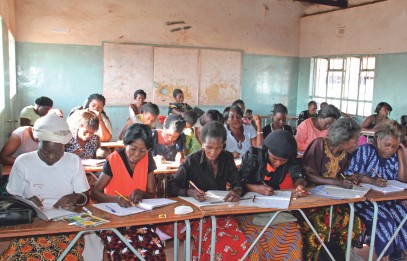 |
|
| WHEN IT'S ABOUT EDUCATION, EVERY BIT COUNTS |
| Education is the most powerful way to bridge gender differences. Sterlite Copper's Ilam Mottukal Project in Thoothukudi District,Tamil Nadu - India aims at ensuring that every girl child is provided with quality school education in an enabling environment so that she can realise her full potential. This project benefits 7,800+ girl children studying in over 80 Government and Aided Primary Schools in the District and is aimed at enabling support for their holistic development including provision of additional academic support and educational kits. |
|
|
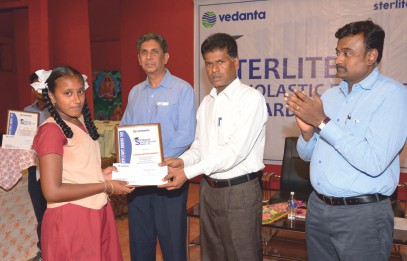 |
|
| |
| Sterlite Copper also recognises bright students every year since 2000 to fulfil their pursuit of higher education. 400+ district level toppers in the Board exams have been presented the Scholastic Excellence Cash Award and scores of meritorious & economically marginalised students are being awarded an Annual Educational Scholarship, till date. |
|
| ADDING SMILES TO A NATION'S HAPPINESS INDEX |
| When Sandhya joined the Khushi centre in Gusai Kheda about 2 years ago she was severely malnourished and extremely shy. But after enrolling at the Khushi centre not just did she gain weight, her personality too flowered. Today, she is a healthy 5-year old child who happily recites poems, counts numbers, and interacts with everyone. The Khushi centres being run by HZL are designed for children just such as Sandhya. We believe, no child should be bereft of the simple joys of life such as having a wholesome meal, playing with other kids, as well as learning holistically. With this objective, 'Khushi' child-care centres reach out to the children residing in remote hinterlands. The locations have been strategically chosen wherein government child-care centres are not easily accessible. |
| |
| The Khushi centres facilitate nutritious food, hygiene, healthcare and preschool education in a play way method. HZL directly runs 18 such centres and has also signed an MOU with the state government to strengthen other 3,000 state-run child-care centres. |
|
 |
| |
HEALTH - WATER & SANITATION
|
| Poor access to sanitation is a major cause of illness in India. Our goal is to create a lasting change in the health quotient of our communities through our two flagship hygiene & sanitation programmes: WASH Pledge for Action and Improving Sanitation Infrastructure. Both these initiatives are aligned to the sixth SDG - 'Clean Water and Sanitation' and also echo the clarion call for Swachh Bharat (Clean India) given by India's Prime Minister, Mr. Narendra Modi. |
|
 |
|
| |
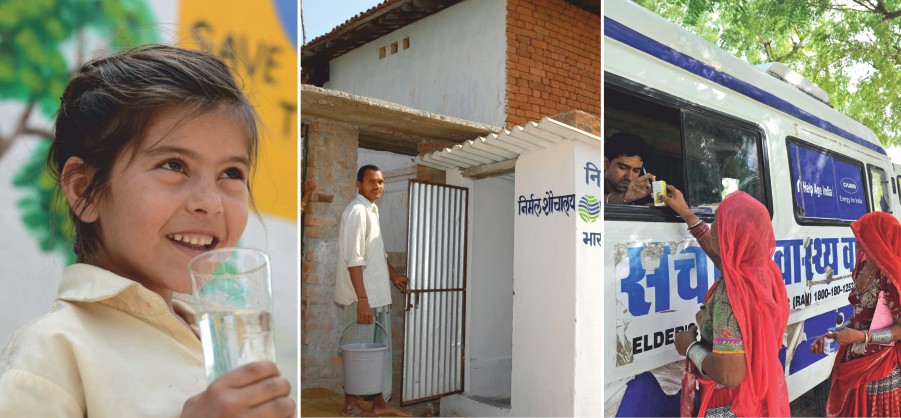 |
| |
| WASH PLEDGE FOR ACTION |
| In FY 2014-15, Vedanta signed WBCSD's WASH (Water & Sanitation Hygiene) Pledge, which seeks commitment from companies to ensure access to safe water, sanitation and hygiene for all employees. Going a step ahead, we have aligned our actions to secure safe sanitation for our communities. Laying the cornerstone of this drive, our company-controlled operations underwent a self-assessment. General findings pinpointed the need to raise awareness, provide more sanitation facilities, institute better maintenance systems and deploy better technology to mitigate water wastage. |
| Action has been initiated on a war footing in the below three areas: |
| 1 Awareness |
- Internal training to create
awareness among permanent
and contract employees
- Signage and public meetings
to spread the message in
communities
|
|
|
| 2 Infrastructure |
- Construction of 650+
washrooms in schools
and communities
- Training housekeeping staff for
efficient maintenance of facilities
|
|
|
| 3 Monitoring |
- On-ground scoring and
audit of the infrastructure
and community buy-in
- Monthly review
|
|
|
| Executing this initiative is not a mean task as the local communities lack basic awareness on sanitation and hygiene. This challenge is compounded by the topographic complexity of Rajasthan, an arid, water-scarce region. But our impassioned team is ready to convert the roadmap into reality and WASH has already been implemented across two of our large subsidiaries, Hindustan Zinc Ltd. (HZL) and BALCO. This programme, will also be adopted by the rest of our businesses in the next reporting year. |
| Improving Water & Sanitation Infrastructure |
| We target to build 50,000 toilets for households and schools in Rajasthan, in the next 3 years. |
| With their intervention so far, Cairn and HZL have together freed 8,800+ families from open defecation in Rajasthan. In addition, we have ensured 24*7 access to potable water for the residents of Barmer and Sanchore, Rajasthan, by installing ATW (Any Time Water) machines with RO plants. |
| In Tamil Nadu, Sterlite Copper has partnered with the Thoothukudi District Administration to promote total sanitation in schools and panchayats. |
| Along with sanitation, we also run targeted nutrition programmes for women and children with an aim to treat anaemia, malnutrition and locally prevalent, treatable illnesses. We have setup 44 health clinics, where villagers receive prompt healthcare support. |
| Our approach to healthcare delivery transcends offering curative support. We strive to usher in behavioural change by spearheading health awareness drives and also aid in building infrastructure such as toilets, drainage lines and garbage disposal facilities. |
|
|
More than 35,000 families
in Rajasthan benefit
annually through our
water programmes. |
| |
To ensure outreach in
isolated hinterlands, we
deploy mobile health vans.
Sterlite Copper operates
'Healthcare on Wheels' in 28
neighbouring villages
providing free primary and
secondary healthcare access
to 50,000 people. |
|
|
| |
| INITIATIVES |
| ELIMINATING THE MENACE OF MALARIA IN INDIA |
| In Lanjigarh, Odisha - India we continue to provide essential medical services in inaccessible areas through our outreach programmes and mobile health clinics. Our health intervention in this area has been instrumental in bringing down malaria deaths to zero and embedding awareness about health issues in close to 50,000 community members. The residents of this small town, which was once a malaria endemic zone, have now become more aware of their health and ensure wellness of their family. |
|
|
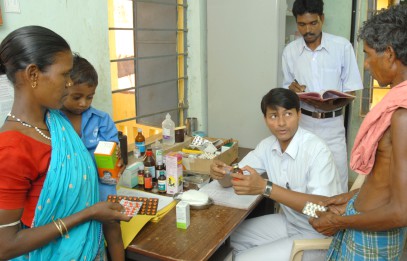 |
|
| COMBATTING HIV IN AFRICA |
| In Africa HIV is a major health challenge. To address this challenge, KCM has spearheaded an extensive community outreach programme towards providing HIV/AIDS prevention and care intervention to community members. |
| Last year, over 15,000 community members availed of the Voluntary Counselling And Testing (VST) services. |
|
|
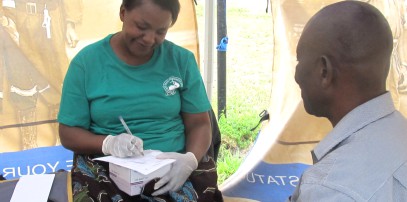 |
|
 |
| |
WOMEN EMPOWERMENT
|
| Self Help Groups (SHGs) are a powerful medium to empower women in the deepest rural pockets through socio-economic independence. |
We supported 2,800+ SHGs, reaching 38,000
women, which is more than twice the number,
a year ago. |
| SHGs supported by Vedanta offer training in tailoring, stitching, local crafts, animal husbandry and organic farming, with an aim to open doors to income generation opportunities. Market linkages are also provided, wherever possible. |
|
|
Direct Economic Impact
through SHG support |
FY 2015-16 |
|
|
|
| Total number of SHGs |
2,840 |
| SHGs engaged in income 570
generation activities |
570 |
| Total members in SHGs |
38,099 |
| SHG members engaged in income 4,207
generation activities |
4,207 |
| No. of women who established 180
micro enterprises |
180 |
|
| |
|
|
| SHGs also provide women the opportunity to socialise with other women, share their concerns and learn from others' experiences. This leads to their holistic well-being. |
| |
| SUCCESS STORY |
| HELPING MANJU HELP HERSELF |
| Manju Singh Chauhan lives in Mansingh Ji Ka Kheda, one of the core intervention villages under HZL's CSR ambit. Manju got associated with a Self Help Group in 2007 and has not looked back ever since. As a first step towards financial independence, she purchased a sewing machine with a loan taken from the SHG and kept picking up new techniques and skills whenever HZL organised sewing trainings. Soon, people began to recognise her talent and the sewing machine became an integral part of her household. |
|
|
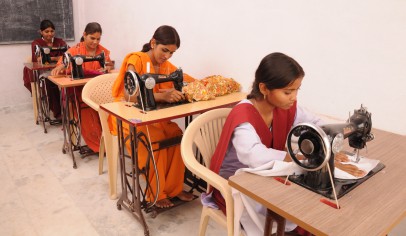 |
|
| |
| Today she contributes significantly to the family income and is committed to direct other rural women on the path of empowerment. Manju's story is just one of the many success stories of the women of this village that we take pride in sharing. There are many already written, and many more waiting to be written. |
|
 |
| |
| |
 |
|
| TRANSFORMING THE ANGANWADI MODEL |
| Nand Ghar - the New-gen Childcare Centre |
|
 |
|
| In India, the role of Anganwadi (childcare centre) is critical in combating malnutrition, promoting pre and postnatal care, immunisation and early childhood education. Though the nation is home to over 1.37 mn Anganwadis, their impact is far from what's desired. The need of the hour is to enhance the efficacy and efficiency of Anganwadis. |
|
|
| |
| |
|
| |
Project Nand Ghar
is designed in line with
Prime Minister of India's
vision of Beti Bachao
Beti Padhao, Startup India,
Swachh Bharat
and Skilling India. |
| |
 |
|
| |
| With an aim to modernise the Anganwadi infrastructure in the country, Vedanta signed an MoU with the Ministry of Women & Child Development to construct 4,000 new age Anganwadis across India. |
| Our model reimagines existing Anganwadis and enhances their role. To be developed in high-burden districts, they will be called Nand Ghars and shall be equipped with state-of-the-art infrastructure including access to nutritious food, clean water, sanitation and perennial solar power supply. |
| They will enhance capacity utilisation of the infrastructure by being an access point for primary healthcare and hosting women's skill development programmes, in the free hours after the children's education. |
| |
 |
| We are transforming the fate of villages by empowering their future custodians - mothers
and children. |
Roma Balwani | President, Group Sustainability CSR
and Communications |
|
|
| Education |
- Smart learning kit for children
- Interactive e-learning
|
| Primary Healthcare |
| Each cluster of 25-30 Anganwadis to have a medi-clinic and a mobile medical unit, which will provide free OPDs, free medicines, and diagnostics for maternal and childcare |
| Nutrition |
| Supplementary nutrition to be provided to children from 6 months to 6 years, and to pregnant and lactating mothers |
| Livelihoods |
- Hosting women's skill development programmes
- Creation of micro enterprises to promote
entrepreneurship
|
|
| 50 Nand Ghars are operational as of now and other 50 will become operational by June 2016. Once all 4,000 Nand Ghars get constructed, 400,000+ children and women will benefit every year. With this endeavour, we hope to significantly transform the lives of women and children in rural India, and impact the prosperity of villages at large. |
|
|
|
| |
|
|
| |
SKILL ENHANCEMENT
|
| Skill building equals nation building. Skilling empowers the youth to integrate with the mainstream economy, plus it gives a significant fillip to the economy itself by providing trained manpower to industry. |
| In the reporting year, we continued to focus on developing employability among youth by imparting skills in a wide range of trades. |
|
|
Direct Economic Impact
through Youth Empowerment |
| 5,800+ youth were provided vocational skills training
in FY 2015-16 vis-à-vis 3,800+ youth in FY 2014-15 |
| 2,900+ youth linked to earning opportunities in
FY 2015-16 vis-à-vis 2,200+ youth in FY 2014-15 |
| 375 youths engaged under micro enterprise development |
|
|
| |
| |
 |
|
| EMPLOYABILITY DEMANDS MORE THAN JUST SKILLS |
| Cairn Enterprise Centre and Cairn Centre of Excellence |
| Challenge Barmer, where Cairn operates, is one of the most socio-economically disadvantaged districts in India. With a view to provide opportunities to the local populace of the region, we established the Cairn Enterprise Centre (CEC) in 2009 under a joint venture with the IFC. This journey started with its share of hiccups. While training was being provided efficiently, linking them to employment opportunities was proving to be a challenge. This was due to a host of factors such as low reliability, scant work ethics, unpunctual behaviour, absenteeism, resistance towards relocation and reluctance to take up full-time jobs. |
|
|
| |
 |
| |
| Intervention |
| Based on what we learned, we initiated a major transformation in the training curriculum and methodology. These included: |
- Pre- and post-training counselling
- On-the-job practical training before actual
placement to acquaint trainees with on-ground
realities and employee expectations at work
- 'Outreach' centres to deliver training at the
doorstep of the community
- Incentive mechanism to motivate training partners
- Candidate tracking for a year, post-training
- Post-placement financial support for 3 months to
take care of relocation costs and provide an extra
incentive to continue the job
|
| Outcome |
| The model has transformed the employability statistics and the centre has achieved a 75% placement rate. |
| In FY 2015-16, 900+ youth underwent training and 750 of them were successfully placed in organised sectors. |
| Buoyed by the success of this centre, we have established a US$ 10 mn Cairn Centre of Excellence (CCOE) at Jodhpur, to offer training in advanced disciplines. Built as per European standards, |
|
|
| the centre has sourced expertise from TUV Rheinland, a well-known German training firm. Students from the Cairn Centre of Excellence have bagged placements in reputed companies like Amazon, Samsung and Suzlon. |
| The success story of the centre has become
an international case study, with other
organisations keen on replicating this model. |
|
| |
 |
| In July 2015, we signed an MoU with the Rajasthan Skills & Livelihoods Devp. Corp. (RSLDC) in the presence of the Rajasthan Chief Minister, Ms. Vasundhara Raje. |
| Initially RSLDC extended support to 200 students per annum; witnessing the success, support has been expanded to over 600 students per year. |
|
|
|
| |
|
|
| |
FARMING & ANIMAL HUSBANDRY
|
| Agriculture is the main source of income in rural India and Africa. Not only is it subject to vagaries of monsoon and problem of pests, but also largely impacted by malpractices of middlemen. |
| To help improve yields and fetch a fair price for their produce, we reach out to farmers in villages close to our operations. We distribute high-yield seeds, offer training, encourage adoption of new scientific technologies as well as help market their produce. |
| In FY 2015-16, we assisted 7,000+ farmers. Below are a few success stories: |
|
|
- Trained Indian farmers in 'Systematic Rice
Intensification Technique' achieving milestone
outcomes. 17 farmers increased their crop yield by
as much as 40%.
- In 2010, KCM, Zambia flagged off a 5-year cattle
empowerment project with 40 beneficiaries. By
the end of 2015, about 600 cattle have been given
out to 300 farmers under this project and
beneficiaries have begun to barter goods for milk.
|
|
|
| |
| |
 |
|
TURNING THE COMMUNITY'S INDIGENOUS
KNOWLEDGE INTO BUSINESS |
| Challenge Although classified as a middle-income country, a large portion of the Namibian population remains vulnerable. Skorpion Zinc operates in Karas region which is a home to a section of marginalised households. |
|
|
| |
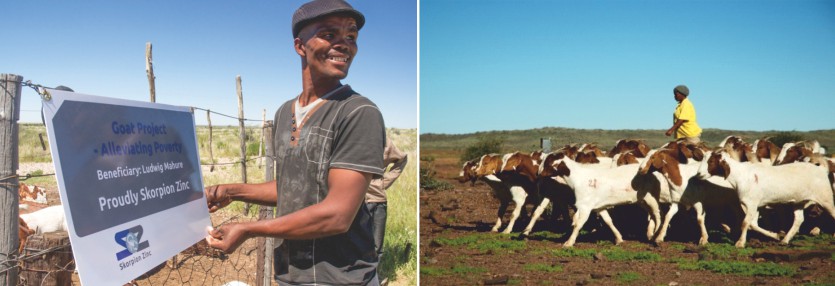 |
| |
| Action |
| The company looked at this challenge holistically and worked with the Namibian Ministry of Agriculture to implement a Goat Project for marginalised households. |
| The two enablers behind the project's successful implementation were: |
- Shaping a project that builds on the
communities' indigenous knowledge of goat
keeping and encouraging the people of the
region to take up goat production as a business
- Designing the project on an innovative, socially
& economically sound and sustainable model.
|
| A needs assessment was also conducted before initiating the project. Skorpion Zinc provided training, funded the purchasing of the initial goat breeding stock, goat farming training, vaccination and dosing of the goats, transportation and other logistical arrangements pertaining to the successful establishment and monitoring of the project. |
| In FY 2015-16, 900+ youth underwent training and 750 of them were successfully placed in organised sectors. |
| Buoyed by the success of this centre, we have established a US$ 10 mn Cairn Centre of Excellence (CCOE) at Jodhpur, to offer training in advanced disciplines. Built as per European standards, |
|
|
| A total of 16 households, 4 households each from 4 community clusters, received 30 ewes (female sheep) and a ram (male sheep) each. |
| The uniqueness of the project lies in its multiplier-effect model, as some of the off-springs produced in the first lambing and possibly the second lambing will be given to a second set of beneficiaries who will reciprocate the process. This will essentially create a perpetual fountain of beneficiaries for many years to come. A total of over N$ 700,000 has been invested in this project. |
| Outcome |
- The project is well poised to deliver on its first
revolving leg with new beneficiaries getting
their share of start-up goats
- Not only the recipients, but also the families
who sold the goats to the project, earned a
good income. Around 90% of the goats sourced
were from communal farmers making them
indirect beneficiaries.
|
|
|
| |
| Over 60% of the beneficiaries of the project were women, a deliberate intervention to assist women headed households in rural Namibia. |
 |
 |
| I now look after my own animals rather
than tending after other people's livestock
for little money and food. |
| Ludwig Mahure |
|
| Maria Cloete tends to her new flock
of goats in her village Snyfontein in the
Berseba communal area. |
|
|
| |
|
| |
|
|
| |
| TRANSFORMING RURAL INDIA |
| We have adopted 5 villages in India with an aim to transform them into model villages, through focussed intervention on women and child development. We mapped the results of the local needs assessment study with The National Policy for Children and SDGs to arrive at the following areas of intervention. |
| Sanitation |
Health |
Education |
Empowerment |
|
| 100% coverage of households through individual household toilets |
100% coverage of households for access to primary healthcare |
| Reducing dropout rate
of girls, post class 8th |
| Behaviour change through gender sensitisation trainings |
|
| Increasing participation
in decision-making at
Panchayat level |
| Training programmes for creation of microenterprises |
|
|
| Our CSR teams have activated a host of interventions and the outcomes will start manifesting from the next reporting year. |
| |
| INITIATIVES |
| AID IN TIMES OF DISTRESS
|
| It is every corporate's responsibility to step up in times of national calamity. Sterlite Copper lent a helping hand to the victims of the Tamil Nadu floods by distributing relief material, dewatering flooded areas, cleaning up channels and strengthening water bodies. |
| As immediate relief, 42,000 food packets were
distributed across relief camps and free medical camps were conducted. To facilitate rehabilitation, bedding and cooking utensils worth INR 1,000 were provided to each flood-affected family. |
|
|
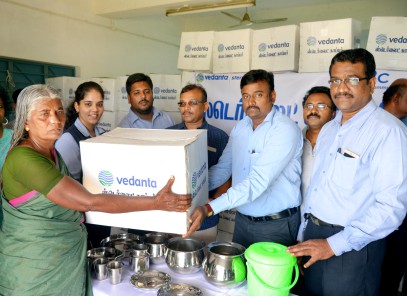 |
|
|
| BEARING THE FRUITS OF ARBOR DAY
|
| Skorpion Zinc together with Agri Green Grow spearheaded a project to develop an orchard in rural schools, as part of the Arbor Day celebrations. |
| Skorpian Zinc offered a sponsorship of N$10,000 to each school while Agri Green Grow provided 25 Growboxx plant cocoons® with fruit tree saplings under the Green Musketeer project. The Growboxx plant cocoon® helps the tree to start growing, and then degrades and functions as a nutrient. |
| The idea of the project was to educate the youth on reforestation and green technology as well as to provide an additional sustainable income source for the schools from the sale of the fruits. Skorpion Zinc has committed to make this an annual sponsorship model to spread the message of going green, and promote responsible usage of water in Karas region. |
|
 |
| |
|
| |
| For more information visit our group companies |
| |
|
|